K-Pop isn’t the only hot ticket in Koreatown — how ‘trot’ is captivating immigrants
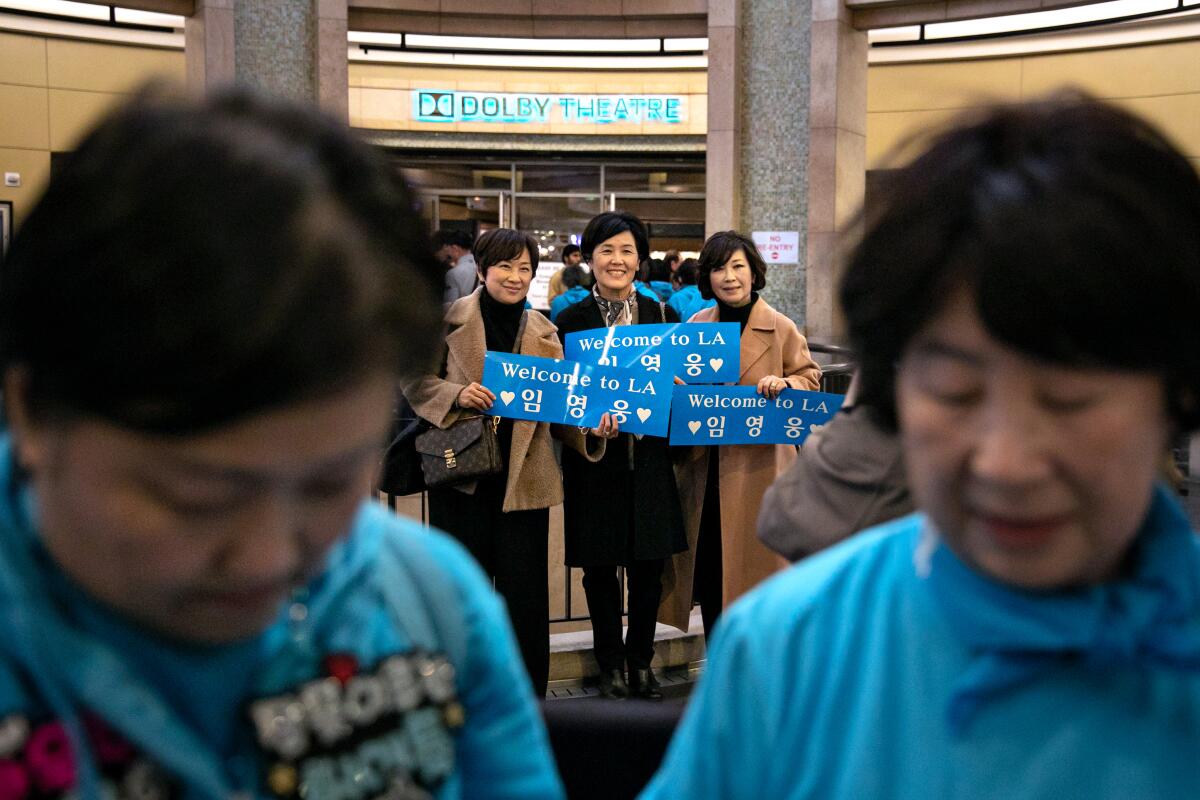
- Share via
Eunice Kim, a 57-year-old homemaker in Mission Viejo, has spent $800 buying Lim Young Woong’s albums.
With other members of a fan club, she has spent six straight hours discussing her favorite singer — his latest appearance on a Korean variety show, the dolls of him they are purchasing from South Korea.
Last month, Kim was among the thousands of Korean Americans in matching turquoise blue sweatshirts at the Dolby Theatre in Hollywood swooning over Lim, a superstar of “trot,” a genre of Korean pop music that hearkens to the Japanese colonial era and has a Sinatra-like crooner feel.
Lim, 31, looks like a typical K-pop star with his boyish looks and thick locks of hair curling over his forehead. But he belts out ballads that appeal to a much older audience, with nostalgic lyrics about lost love and longing for one’s homeland.
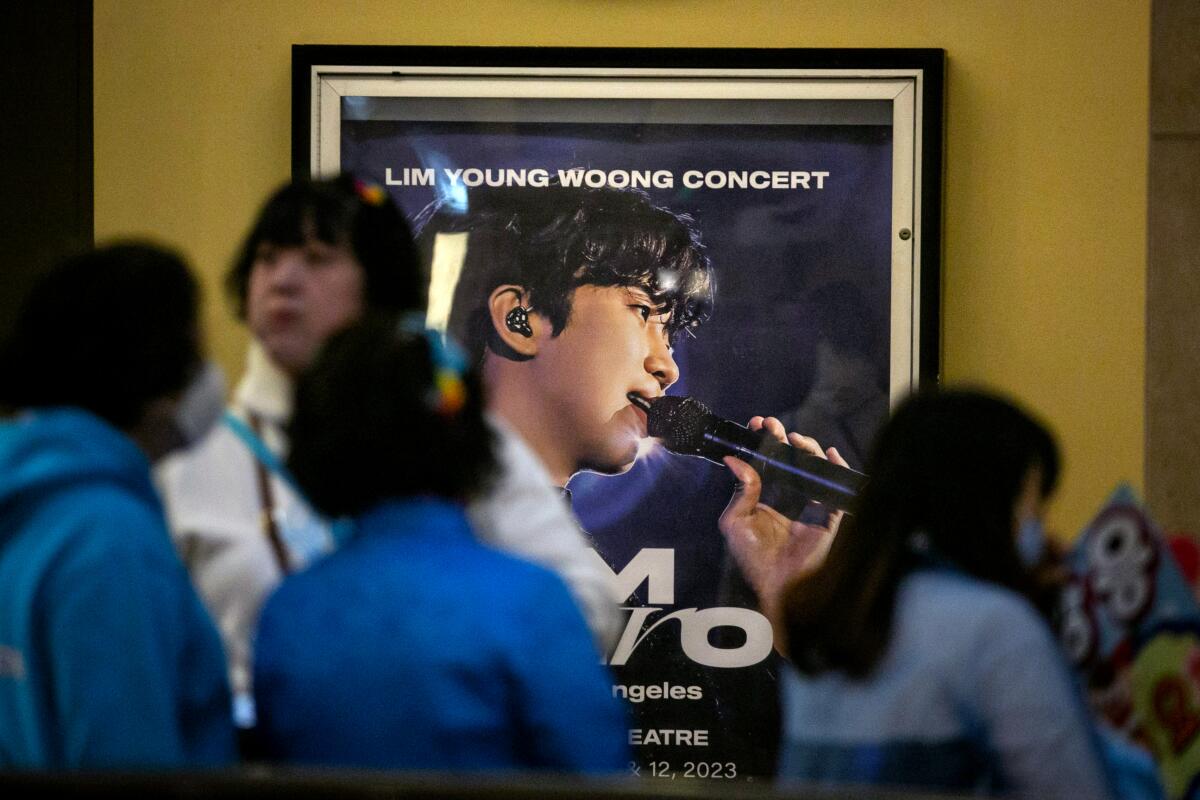
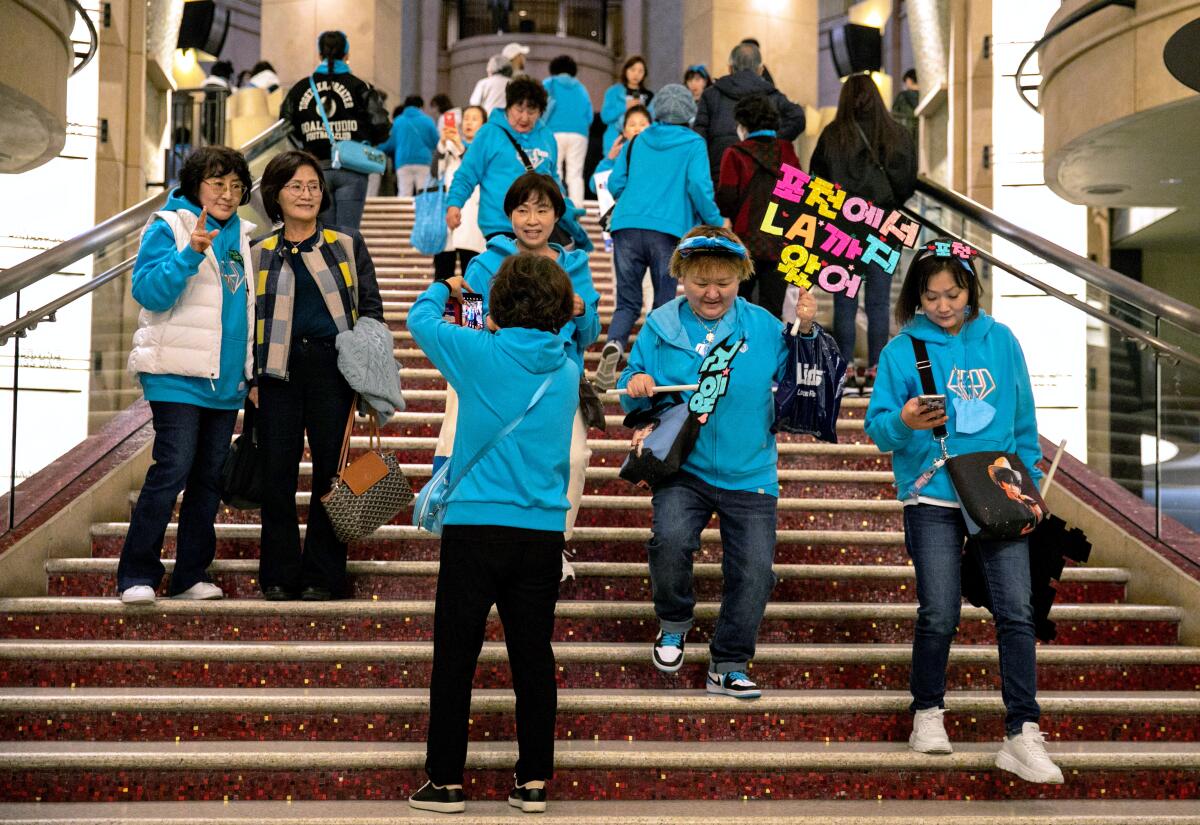
For many Korean immigrants, trot songs tug at the feelings they often suppress as they go about their daily routines in their adopted country. Some fixate on stars like Lim, whose Korean name means “Hero,” finding solace not only in the music but in the community they build with one another.
In Kim’s living room, the “Hero Generation” fan club gathers to watch livestreams of Lim concerts. At their own homes, their group chat lights up as they set their alarms every half hour to cast multiple votes for him in award contests.
“We talk about how we need to spread the blue wave,” Kim said, referring to the fan club’s official color.
One club member, Deborah Park, discovered trot after her husband died in November 2019. The timing was especially cruel — he had just retired after 35 years of hard work painting homes and buildings.
The isolation of the pandemic aggravated her pain, said Park, 70, who lives in Seal Beach. Her son came from Minnesota to care for her.
Around that time, Park spotted Lim on “Mr. Trot,” a reality show similar to American Idol (there is also a “Miss Trot”). Park wasn’t a big TV watcher, nor did she have a hobby. Lim’s warm, expressive voice resonated with her.
She joined the Southern California fan club soon after.
“I want to live long, for Young Woong,” Park said. “I’m busy. I’m happy, and I don’t feel the pain.”
Lim, who also sings in styles including folk and hip-hop, is far from the only millennial or Gen Z trot star.
Younger singers perform a mix of covers and original songs, such as Young Tak’s “MMM” (Like a Gentleman) and Song Gain’s “Moon of Seoul” — even though many weren’t even born during trot’s last big heyday in the 1970s and ’80s.
Even Jin, a member of BTS, joined the trend in 2021 with his song “Super Tuna.”

Trot singing, which gets its name from the foxtrot dance step, is known for its pronounced vibrato and for kkeokk-ki, where a note is embellished by fluctuating between surrounding pitches, said Son Min-jung, a professor of ethnomusicology at the Korea National University of Education who has studied the genre for decades.
For a nation that was colonized by the Japanese in the early 20th century, fought a tragic civil war and remains split in two, trot is the musical genre that “most captured Koreans’ plight and sadness” and that serves as a “collective memory,” Son said.
“Amid the rain in a train heading south / outside the shaking windows,” Kim Soo Hee sings in “A Southbound Train,” which came out in 1987 and is one of the most popular trot songs. “Rain is falling / so are my tears and my lost first love / … Although we cannot meet / don’t forget about me.”

With the rise of rock and folk music and then K-pop, trot fell out of favor.
Then came the “American Idol”-like audition programs that catapulted some singers like Lim to a K-pop-like fame.
Fans young and old became invested in the singers’ stories, using apps such as KakaoTalk to campaign for their favorite artists on the audition programs, Son said.
The two unofficial Southern California chapters of “Hero Generation,” in L.A. and Orange counties, have 50 or so regulars combined — but the number of trot devotees is much larger.
At the Koreatown Senior and Community Center, about 30 retirees sashayed and shuffled to trot hits.
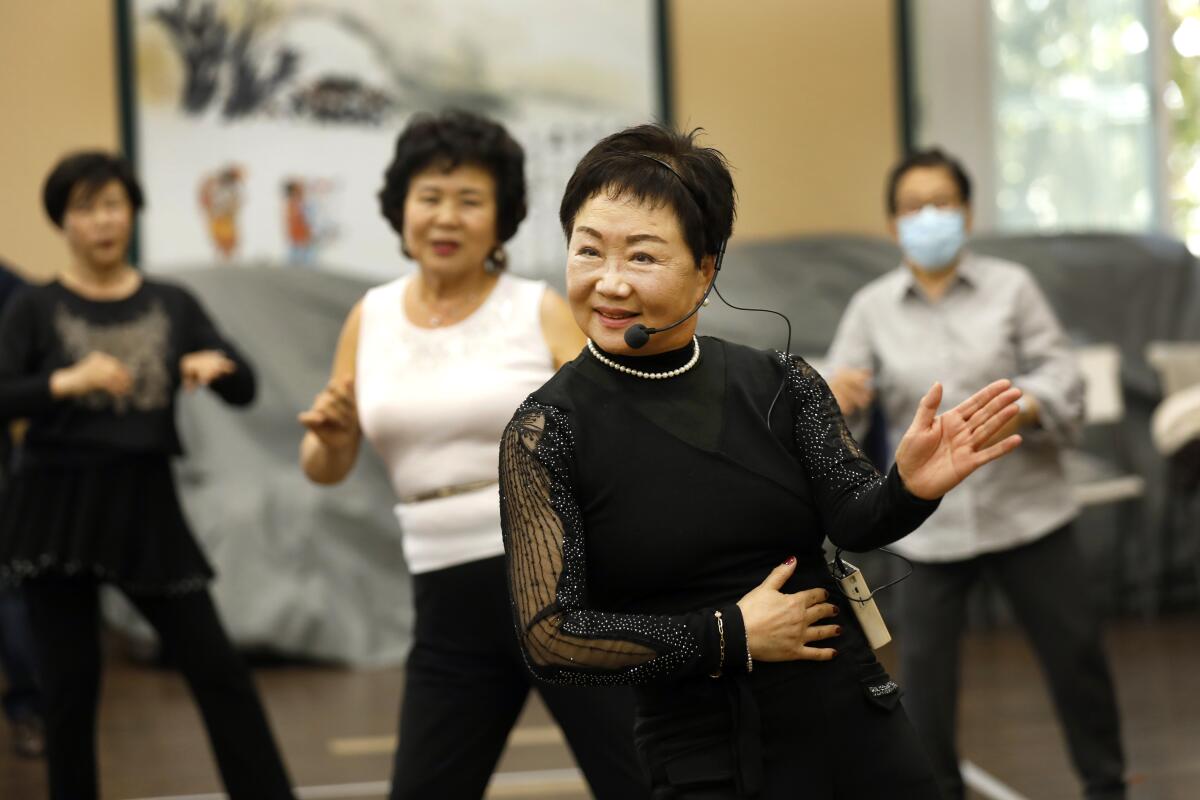
“Don’t run / you may get hungry / heartbreaking hardship road,” Jin Sung sang in “Bo-rit-go-gae”. “When you filled your empty stomach with a bucket of water / How did you live?”
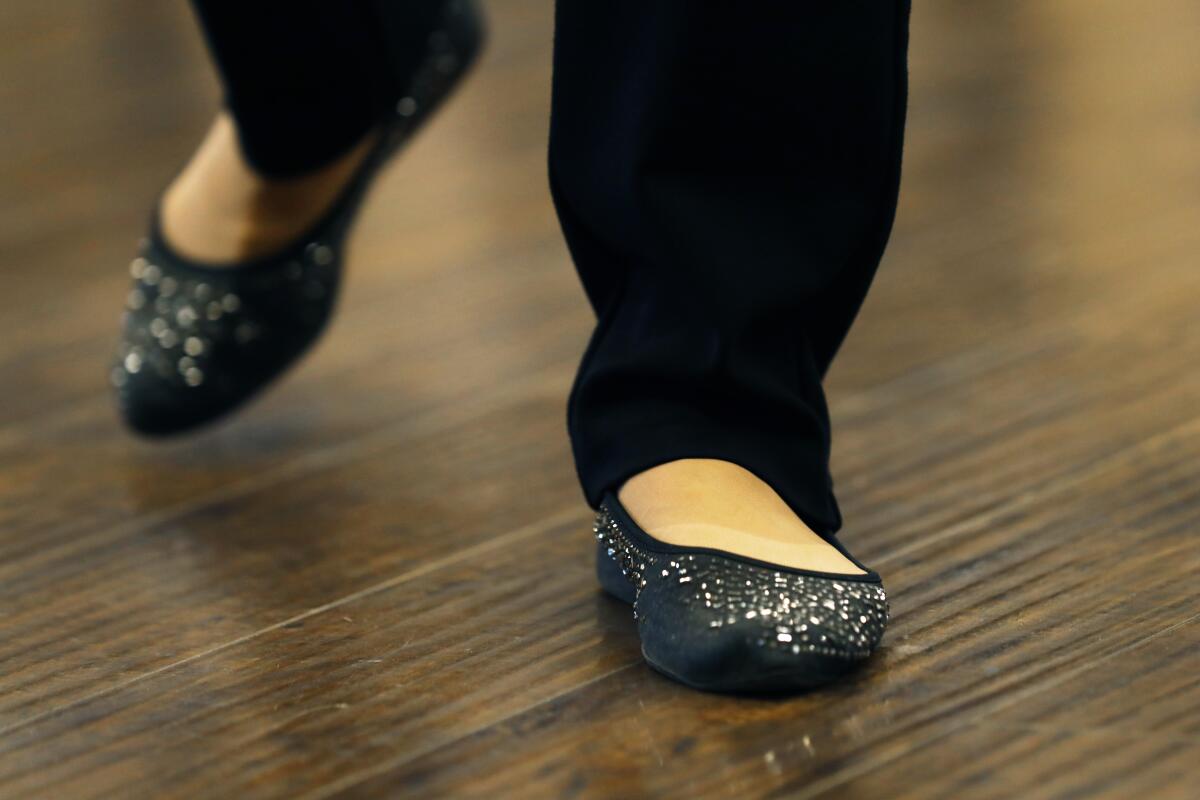
Choi Sook Ja, 75, bounced her hips and pointed her fingers. She likes American pop music, but she said she just can’t leave her homeland behind. Trot’s sad, nostalgic lyrics best capture how she feels — though there is also joy in the songs and their rhythms, Choi said.
“Even if you don’t know the choreography, you can dance,” said Choi, who came to the U.S. about 30 years ago and ran a liquor store in Riverside until retiring about a decade ago. “As I get older, I get nostalgic … Even when I live in the United States, my heart is in Korea.”
As Lim’s Feb. 11 and Feb. 12 shows approached, fans rushed into K-Pop Music Town in Koreatown. Blue lightsticks and albums filled with photos of Lim packed much of the store, as one of Lim’s “Mr. Trot” performances flashed on monitors.
“Oh, it’s Young Woong,” a poster of Lim prompted one fan to exclaim.
“Oh, it’s Hero,” another fan yelled.
Sophia Im, the 53-year-old manager, cautioned the excited fans to be careful, lest they accidentally bump into one another and damage the merchandise. She had never seen so many older Korean immigrants in the store. Some fans spent hours chatting about Lim.
“This store has become a meeting place,” Im said.
At Lim’s Feb. 11 show, which had sold out in minutes, fans from Seoul, New York, Sweden and elsewhere waved blue lightsticks and signs — “Starlight-like my HERO,” one read.
Some sported pins on their shirts with fan club nicknames like “Dewdrop” and “Honey Voice.” They greeted one another with Lim’s signature gesture, curving their hands at a 90-degree angle with thumbs upward to mean geonhaeng — “be healthy and happy.”
“My heart is racing,” said Soyeon Kim, a 54-year-old homemaker from New Jersey. “This is the first time I’ve gone crazy for someone.”
Before launching into the folk ballad “Love Letter,” Lim thanked the thousands of fans who packed the theater. He wants to come to L.A. more often, he said.
“These bright moments in the past — we can’t go back,” Lim said. “But I — your son, your grandson, your friend, your oppa (older brother) Young Woong — will sing about them.”
Eunice Kim, who was there with her husband, would be back with four friends the next night for Lim’s second show.
More to Read
Sign up for Essential California
The most important California stories and recommendations in your inbox every morning.
You may occasionally receive promotional content from the Los Angeles Times.











